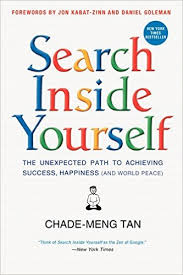 When it comes to excelling in the professional world, there are many elements that need to be considered in order to succeed. On the surface level, one must have the basic expertise or knowledge of the field– that is why the person was able to be hired in the first place, right? They were able to impress the hiring committee with what they have on paper. However, having the basic skills to complete the work at hand is only one piece of the puzzle. In Search Inside Yourself: The Unexpected Path to Achieving Success, happiness (and World Peace), Chade-Meng Tan points out that success is achieved not only by simple intelligence, but by obtaining a high level emotional intelligence.
When it comes to excelling in the professional world, there are many elements that need to be considered in order to succeed. On the surface level, one must have the basic expertise or knowledge of the field– that is why the person was able to be hired in the first place, right? They were able to impress the hiring committee with what they have on paper. However, having the basic skills to complete the work at hand is only one piece of the puzzle. In Search Inside Yourself: The Unexpected Path to Achieving Success, happiness (and World Peace), Chade-Meng Tan points out that success is achieved not only by simple intelligence, but by obtaining a high level emotional intelligence.
One particular part of his theory that stood out to me was in Chapter 7, titled Empathy and the Monkey Business of Brain Tangos. Throughout this chapter, Tan points out that it is the way in which individuals build relationships with their coworkers that helps the overall performance of the organization. Tan focuses in on how establishing empathy “is not just nice; [but] essential for helping you succeed at your work, especially if your work involves building a team or coaching, mentoring and caring for other” (174). Having empathy is an active way that employees can work on understanding each other. Tan also draws on the Marc Lesser’s model for achieving positive work environments:
- Establish trust.
- Listen (by “looping” and dipping”).
- Ask probing and open-ended questions.
- Provide feedback.
- Partner to create options and practices.
I think that this is very practical advice, especially for me as a new member of the corporate world. It may be is easy to have the mentality that everyone is in competition with one another to stay at the organization. However, we have 100% of combating this default mindset. Rather, if we approach the new work environment and our relationships with our coworkers like the model above, we have the power to develop deep and meaningful work relationships that will alter the entire environment of the company.
One other section I really appreciated was in Chapter 8, titled Being Effective and Loved at the Same Time: Leadership and Social Skills. Tying in the ideas above, Tan mentions that, “You do not have to get things done at the expense of being liked; it is possible to have your cake and promotion too. In fact, being liked may be the most effective way to get things done in the long term” (194).
I find this mindset SO refreshing. No longer do people need to enter a dog-eat-dog world to accomplish a task, rather the more that people address a project with kindness, the more success is to follow.
I really appreciate that I was able to learn these lessons early on in life. As someone who has aspirations in climbing the ladder of the company, I feel like these are the skills and mindsets I can take with me along my journey.
I have also found myself trying to see the ideas and theories of Tan play out in the workspace. I have noticed that many of my coworkers do in fact embody the Tan lifestyle, whether they know it or not! It is a great feeling being a part of an organization that has people I can look up to and admire in terms of leadership and work ethic.
In the future, I hope that I consciously work on building trust and have empathy towards others in order to create a healthy and productive work environment for me and for everyone else.
